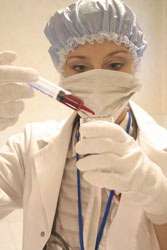Double attack on SARS

After the SARS-CoV (severe acute respiratory syndrome coronavirus) outbreak in 2003, academia experts in immunology and molecular biology joined forces with industrial vaccine production experts in order to develop preventive and therapeutic measures for SARS.
Despite the fatality of the SARS-CoV outbreak in Asia, the rising summer temperatures and quarantine measures managed to contain viral spread. However, it is believed that the SARS-CoV has not been fully eradicated and as a result, a vaccine as well as an immediate and effective treatment regimen are much needed.
To this end, scientists on the EU-funded 'Immunoprevention and immunotherapy of SARS infection' (Sarsvac) project proposed to follow a vaccination approach coupled with an immunotherapeutic regimen.
More specifically, the strategy for vaccine development consisted of two parallel approaches: the preparation of a classical vaccine made with attenuated SARS-CoV and the identification of potentially immunogenic viral antigens. These antigens were planned to be expressed in a vector-based vaccine for generating specific immunity against the virus.
Additionally, partners studied SARS-CoV–derived virus-like particles (VLPs) in order to understand the morphogenesis and maturation of virions. The information they obtained allowed them to identify specific viral protein epitopes that offered protective T and B cell-mediated immunity.
As an immunotherapeutic strategy, neutralising human antibodies to SARS-CoV were developed and validated. The plan was to administer these as a treatment option to patients already infected with the virus.
The Sarsvac approach promises an immediate and long-term protection against a potential SARS-CoV infection. Commercial exploitation of this vaccine and immunotherapy combination may prove the solution against a future SARS-CoV outbreak.















